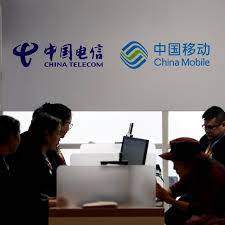Looming Delisting Jolts Chinese Telecom Stocks

Shares in China’s three large telecom carriers were roiled Monday, after the New York Stock Exchange moved to delist the trio to comply with a U.S. government ban.
Hong Kong-listed shares in all three dipped sharply in the first trading session since the NYSE move was announced, before reversing course later in the day.
The NYSE late last week said it would suspend trading in securities issued by the three companies by Jan. 11, while halting trading in closed-end funds and exchange-traded products that hold banned stocks.
Slipping FurtherChina Mobile's share price has been trendingdownward since June 2015.Share price performance since its IPO in 1997Source: FactSetNote: HK$1=US$0.13
2000'05'10'15'200255075100125HK$150
An executive order signed by President Trump in November will block on Jan. 11 Americans from investing in companies the U.S. government says help the Chinese military.
The resulting delisting is a fresh setback for U.S. investors in Chinese telecom companies. These groups rank among the largest global telecommunications providers but have largely lagged behind the broader markets since the companies began listing in the U.S. more than two decades ago.
“This is not a problem for the Chinese telecom companies. It is a problem for the U.S. investors that have to sell, locking in their investments at a historically low price,” said Peter Milliken, head of Asia-Pacific telecom research at Deutsche Bank.
Mr. Milliken said the delistings would have little impact on the carriers’ businesses. “They are cash-flow machines, not needing to be fueled by new capital from the U.S., or anywhere,” he said.
The three Chinese companies said holders of their American depositary receipts can swap those securities for their Hong Kong-listed ordinary shares through Bank of New York Mellon, which is the depositary for all three ADR programs.
The trio said they regretted the U.S. move but stressed the limited importance of their depositary receipts. These securities represent ownership of 3.3% to 8% of the companies’ tradable shares, and account for 9% to 22% of total trading volumes, when both ADRs and Hong Kong shares are considered, they said in separate statements.
Likewise, the China Securities Regulatory Commission said Sunday that the combined market value of the ADRs was less than the equivalent of about $3.1 billion and that the companies would be able to cope with the adverse effects of the ban and the delisting.
The tech battle between the U.S. and China has battered TikTok and Huawei and startled American companies that produce and sell in China. WSJ explains how Beijing is pouring money into high-tech chips as it wants to become self-sufficient. Video/Illustration: George Downs/The Wall Street Journal (Originally Published September 3, 2020)
Still, the financial-market regulator attacked the ban, saying it was introduced for “political purposes, completely ignoring the actual situation of the companies concerned and the legitimate rights and interests of global investors, and seriously disrupting the normal market rules and order.”
While the U.S. government has blacklisted the telecom carriers’ unlisted parent companies, it hasn’t explicitly added these publicly traded entities to its list. But last week, the Treasury Department said it intends to publicly list the subsidiaries of the banned groups, which will then include them in the scope of the executive order. Index providers have moved to exclude some companies directly named by U.S. authorities but haven’t said they would drop stocks in listed subsidiaries of blacklisted firms.
Including Monday’s moves, the telecoms operators’ share prices have declined 16% to 23% since the Nov. 12 order.
Photo: The NYSE said Friday that it would suspend by Jan. 11 trading in securities issued by China Mobile, China Telecom and China Unicom. - PHOTO: ALY SONG/REUTERS
Link: https://www.wsj.com/articles/chinese-telecom-stocks-fall-as-u-s-delisting-looms-11609734838











